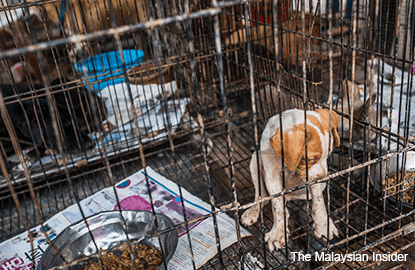
(Sept 23): Culling stray dogs might not be the best solution to contain the outbreak of rabies but Putrajaya was left with little choice due to concerns about public health hazards with the spread of the disease.
This is because it is hard to differentiate dogs with the disease and those without, said deputy director-general (development) of the Veterinary Department Datuk Dr Quaza Nizamuddin Hassan Nizam.
“Among strays, it is very difficult to differentiate between the animals which are diseased and those which are not because not all show classical, clinical manifestation as you might think it would,” he told The Malaysian Insider.
“It all depends on the viral load or how much virus the dog is carrying and at what stage of the disease the animal is in. So although some dogs might look normal, it may be diseased.”
There was no test to check if certain dogs had the disease or not, Dr Quaza said, which made it all the more difficult to weed out diseased dogs from healthy ones.
“You can’t test for rabies. The only way you will know for sure is if you take the dogs, quarantine them for 15 days and observe their behaviour. However, we do not have the resources for that. It is not practical.”
He said tests could only be done on dogs which have been put to sleep as samples must be taken from their brains.
“Under the standard practice, we can only take brain samples. We can’t test blood and that sort of thing,” he added.
The veterinarian said dealing with diseased dogs also posed risks to handlers leading to a public health hazard as infection could be passed on from contact between saliva from infected dogs and human mucous (in open wounds).
“It is quite complex and not so straightforward. Disease is something we need to understand... how it happens and all. We don’t want to unnecessarily expose handlers in dealing with diseased animals and that is the concern we have.
“It is not an easy decision and not the best solution, but under the circumstances, we have to bit more concerned of the public health hazards.”
Rabies is a disease spread from animal to humans through bites and the transfer of mucous or saliva, and can cause death. The disease attacks the central nervous system, causing fever and muscular spasms.
Malaysia, said Dr Quaza, had been free from rabies since 1999, while the World Organisation for Animal Health declared the country rabies-free in 2012 but reports of the disease coming back began in August in the northern states of Perlis, Kedah and Penang.
So far, more than 2,000 stray dogs have been culled in the three states, angering animal welfare groups which have urged the government to practise vaccination instead of killing.
These groups also recently held a protest near the Penang government office at Komtar where they formed the coalition “Stop Killing, Start Vaccinating”.
Coalition secretary Lim Li Lian had said the killing of dogs was not effective and claimed there was no evidence that mass killing could do anything to stop the spread of rabies.
Penang Hope of Strays president Lim Shiang Mey had also said the state must let the World Veterinary Services (WVS) step in and help vaccinate the strays.
She said they failed to see why WVS should not be engaged to help when the international body has a lot of experience in dealing with rabies and could provide equipment and vaccines needed for free.
Under-pressure Penang Chief Minister Lim Guan Eng is facing the prospect of losing votes in the next polls as angry protesters had threatened not to vote for his DAP-led administration and start a campaign to reject him.
Lim said he accepted that he would be continuously bashed, even in social media, over the decision but he could not abdicate from his duties as a public official to the people, their health, and the need to stop the disease from spreading south, to Perak.
“This is a public health matter, which is more important than votes... please also think about those who had been bitten, not just the animal welfare groups.
“I understand that people are talking about a campaign to reject me, which is something immature. This is a public health matter,” Lim said on Monday.
Meanwhile, Dr Quaza said: “Our department, we are the guardians of the Animal Welfare Bill... in fact, we came up with it. We are also concerned about animal welfare. But here, you have to weigh in disease control programmes and public health hazard concerns and animal welfare.
“We are not saying that dog lovers are wrong but what we are saying is that we have a problem in hand and how best are we go to handle it under the circumstances. When we weigh between the life of humans and animals, of course, human life takes precedence.
“As for the public, they, too, should stay away from stray dogs. – The Malaysian Insider